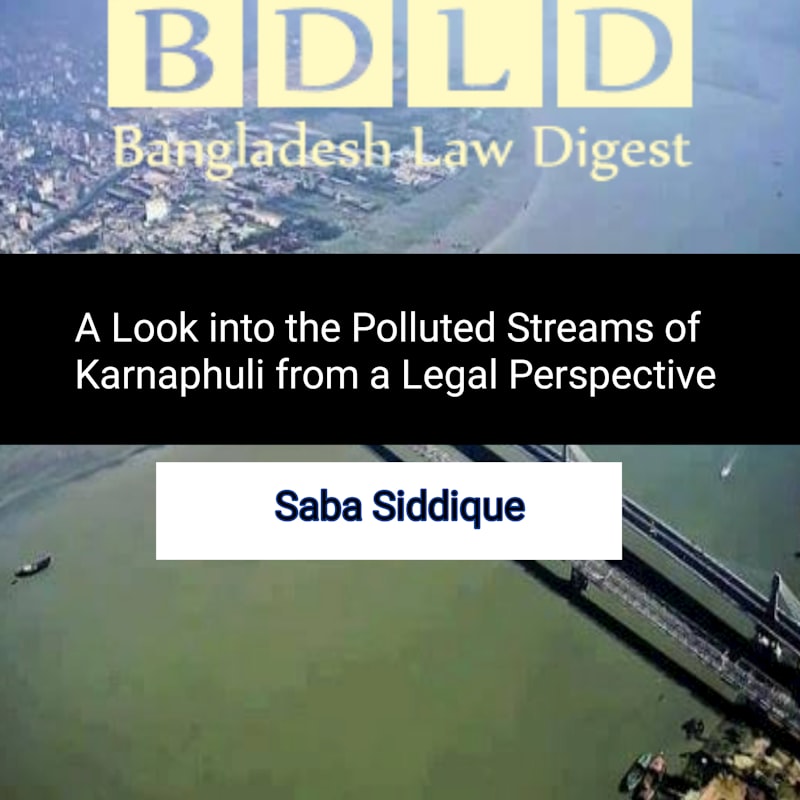Focus Keyword: Environment Court Act 2010
In response to various international conventions, treaties and protocols Bangladesh has developed new environmental legal regime including environmental governance institutions. From 2000, after the enactment of the Environment Court Act, specialized environmental court system has been introduced in the legal system of Bangladesh. In pursuance of the Environment Court Act, 2000, vide a gazette notification dated 6 March, 2002, two special courts with Joint District Judges were set up in Dhaka and Chittagong division, to deal with environmental offences only. An Environment Appellate Court was established at Dhaka for the whole Bangladesh. The Act of 2000 also empowered Magistrates of the first class or Metropolitan Magistrates to deal with environmental offences punishable with less than two years imprisonment or taka 10,000 as fine or both. The Act was amended in 2002 to allow the Joint District Judge/s for a Division to act as the judge of an Environment Court in addition to his/her ordinary functions. From 2005 the Joint District Judge’s Court of Sylhet is functioning as Environment Court in addition to its ordinary functions.
In 2010, a fresh Environment Court Act (Bangladesh Environment Court Act, 2010) has been passed and the Act of 2000 has been repealed. The present Act is aimed to establish one or more Environment Court/s in each district with a Joint District Judge and the said judge shall in addition to his ordinary function dispose of the cases that fall within the jurisdiction of an Environment Court. This is clear that, the present Act has not mandated for separate or independent Environment Court. So that, no more Environment Court has been established till now except the former three Courts and an Appellate Court. Like previous Act, the Act of 2010 also provides for the establishment of one or more Special Magistrate Court/s with the Magistrates of the first class or Metropolitan Magistrates in each District to deal with offences punishable with less than 5 (five) years imprisonment or 5 (five) lac taka as fine or both. Except these two types of Courts there are Executive Magistrates functioning under the Mobile Court Act, 2009. They can take cognizance of some offences at spot and convict the accused on the basis of his/her confession. Under almost all the environmental laws there is a provision to run Mobile Court.
Let’s observe the case filing scenario of these three Environment Courts and the Environment Appellate Court:
Dhaka Divisional Environment Court starts its journey from 2003 and till June, 2015 almost 467 cases have been filed among these, 350 cases have been disposed and 117 cases are pending now. It is worth mentioning that, in 2015 (till June) only 1 case has been filed in this court.
Chittagong Divisional Environment Court starts its journey from 2002 and till June, 2015 almost 350 cases have been filed among these, 250 cases are pending now.
Sylhet Joint District Judge’s Court starts its journey from 2005 and till June 2015 almost 467 cases have been filed among these, more than 300 cases are pending.
The only Environment Appellate Court of the country situated at Dhaka starts its journey from 2005 and till 2015 (June) only 43 appeals have been filed in this court. In last two years only 1 appeal has been filed in the said Court.
In the Environment Courts of Bangladesh average 100 cases are filed in every year. While in the Environment Control Board of New York city almost 7 lac cases are filed in every year.
In global statistics, our Environment Courts have lowest case filing rate.
All over the world specialized environmental judicial system is becoming more popular than ever. But the situation is totally different in Bangladesh. It is clear from the above mentioned case filing rates that, the common people’s aspiration are not reflecting in the Environment Courts of Bangladesh vis-à-vis Courts cannot protecting the environmental rights of common people. Where the ordinary courts of Bangladesh are over flooded with excessive suits/cases and burdened with heavy loads but paucity of cases in the Environment Courts is really ill-matched. Environmental problems of Bangladesh are increasing day by day but why the common people are not coming towards Environment Courts?
Following are the important causes behind the people’s less involvement with Environment Courts:
1. This Act has not recognized the common people’s right of access to Environment Courts directly. Where Sec. 17 of the Bangladesh Environment Conservation Act, 1995 says that, where a person or a group of persons or the public suffers loss due to violation of a provision of this Act or the rules made thereunder that person, group of persons, the public or the Director General on behalf of that person, group of persons or the public may file a suit for compensation before the Environment Court; but Sec. 7(4) of the Environment Court Act, 2010 imposes a bar that, no Environment Court shall receive any claim for compensation under environmental law except on the written report of an Inspector of the Department of Environment (DoE). Even Sec. 6(3) of the Environment Court Act, 2010 says that, no Special Magistrate Court shall take cognizance of an offence except on the written report of an Inspector of DoE. There is an exception of this provision which is more complicated; that is, if the Environment Court/ Special Magistrate Court is satisfied that a person presented a written request to the said Inspector to accept a claim for compensation/ a complaint and no action was taken within 60 (sixty) days after such request, and that such claim/ complain deserves to be taken into cognizance for the purpose of trail, then the Court may, after giving the Inspector or the Director General a reasonable opportunity of being heard, directly receive the claim for compensation/ complain without such written report, or may, if it considers appropriate, direct the said Inspector to investigate the claim/ offence. So it is clear that the common people has no right to sue or file case in the Environment Court directly.
2. From the mandate of the Act it is clear that, Environment Courts have been established only for DoE. Because primary responsibility to file a suit/ case and investigation thereof is vested to DoE. Establishment and smooth functioning of Environment Courts depend on DoE. Though the Act aimed to establish one or more Environment Court in 64 districts but in reality DoE has office only in 21 districts with only one inspector in each office. So it is practically impossible to establish Environment Court without office and manpower of DoE.
3. Jurisdiction of Environment Court is not clear. Environment Court can only entertain offences and claims for compensation under ‘environmental law’; Sec. 2(c) of the Act defines ‘environmental law’ to include the Bangladesh Environment Conservation Act, 1995 and such other laws as may be subsequently be specified by the Government in the official Gazette. But in last 16 years government has not issued any gazette notification to include any other Act. The Brick Manufacturing and Brick kilns Establishment (Control) Act, 2013 specifically mentioned in Sec. 19(2)that,only Environment Court or Special Magistrate’s Court shall take cognizance of any offence punishable under this Act. Environment Court has no jurisdiction to try offences relating to forest-forest resources, wild life-biodiversity, fisheries, water resource and other natural resources.
4. Except legal matters a lot of socio-economic matters are included with environmental justice. Most of the cases polluters belong the upper class of society, they have money and muscle power. On the other hand the victims of environmental pollution/degradation are deprived and poor usually they don’t dare to file suit/case against those mighty polluters. Sometimes concerned government bodies keep themselves in favour of powerful polluters so the poor litigants always feel fear and want of justice.
5. As per Act, Environment Courts follow the Code of Civil Procedure, the Code of Criminal Procedure and the Evidence Act in its judicial functions. Under this existing laws complainant has to prove his/her case and s/he has to bring evidences on behalf of the case. Proving environmental pollution requires technical knowledge and institutional assistance. Common people has no such knowledge and assistance are not available for them. So the people has lost their interest on Environment Courts for its complicated and lengthy process of filing suit/case and ordinary procedure of trial.
6. Speedy trial is the main objective behind the establishment of Environment Court, but the requirements of written report and inquiry by DoE and ordinary procedural law will suffer the spirit of its establishment.
In Bangladesh, protection and improvement of environment is intimately related with the protection of people’s lives and livelihoods. To ensure eco-friendly sustainable development instead of indiscriminate development for the present and future generations we need people oriented Environment Courts with exclusive jurisdiction on all environmental matters. This Act has to be amended in light with the experiences of successful environment court system of the world to ensure direct access of the common people.
━━┅━━━┅━━
Copyright: Any unauthorized use or reproduction of Bangladesh Law Digest (BDLD) content for commercial purposes is strictly prohibited and constitutes copyright infringement liable to legal action.
READ THE RELEVANT ARTICLE : Criticisms on Bangladesh Environment Courts Act 2010














